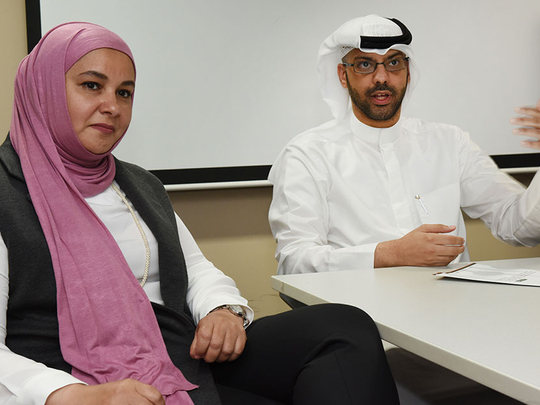
Dubai: A long-standing business partner of the UAE, Kuwait has over the past 18 months made renewed efforts to establish its companies in the emirates.
The Kuwait Business Council (KuwaitBC), a private sector initiative that is run as a non-governmental organisation (NGO), was set up in May 2016 to assist Kuwaiti businesses either looking to open up shop in the UAE, or firms already operating here.
“This is the first of its kind established outside of Kuwait,” said Luma Bourisly, secretary-general of KuwaitBC, in an interview with Gulf News.
Whilst Kuwait has bilateral trade agreements and joint business groups with other countries, Bourisly says the fact that this council was founded by the private sector makes it unique.
“[KuwaitBC was established] by entrepreneurs and investors who are either based in Dubai or have professional or commercial ties with the UAE,” she added.
Easy access
The board of the business council is made up of prominent Kuwaiti business people, including Adel Wakim, the group’s treasurer and National Bank of Kuwait executive (NBK); Fahad Al Shatti, the group’s vice-chairman and vice-president of Kuwaiti logistics company Agility; and Saad Al Rubaiaan, a long-standing adviser to the government of the UAE, who acts as the chairman of KuwaitBC.
Kuwaiti investors, as Gulf nationals, are treated in almost the same way as UAE nationals, in terms of starting a business without the need for a sponsor or partner, and access to the same facilities related to starting a business or listing a company.
With this easy access to the UAE in mind, Sa’ad Al Rubaiaan, the group’s chairman, told Gulf News that he believed it was “important to work as a community rather than work as individuals.”
“As a business community, we are Kuwaiti companies, we are investors and entrepreneurs, as well as employees, representing the full spectrum of the market,” Al Rubaiaan added.
“Working as a diversified business community,” the members of such a community add value to one another, and to the economy of Dubai, according to the chairman.
According to the Dubai Chamber of Commerce, the number of Kuwaiti companies that joined the chamber increased from 405 companies in 2015, to 592 by the end of 2016.
The business council assists the Kuwaiti community in accessing useful resources, making introductions, and providing essential information for operating in the UAE.
“The first thing people need to know is: How do you start your business here? They need someone to ask,” Bourisly said.
Open doors
Because of the historic relationship between the UAE and Kuwait, Bourisly says that the founders of the business council found that all doors were open to them.
“We find ourselves to be a kind of moderator between what Kuwaiti businesses need, and what is the business potential here in the UAE,” she added.
Occasionally, the business council will run educational seminars for Kuwaiti companies in the UAE. Recently, KuwaitBC held a session on value-added tax (VAT) in the UAE.
“This is something [Kuwaiti companies in the UAE] need to be equipped for, it’s around the corner and so many people are still in denial,” Bourisly said.
Whilst the event was free for members of the council, even non-members were welcome, for a minimal fee.
“We just want to help Kuwaiti businesses as much as possible,” she added.
The groups work in the UAE was exemplified in a recent event in Sharjah, organised by KuwaitBC. There, the group was instrumental in introducing Kuwaiti companies to investors, providing them with local assistance such as locating free zones and so on, and exposing these companies to the opportunities present in the emirate of Sharjah.
As for the kinds of Kuwaiti companies that are on the rise in the UAE, Bourisly and Al Rubaiaan say that it is a mix of start-ups, and more established companies.
“We’re seeing more and more non-conventional businesses evolving, living in the digital space. These are being pioneered by the younger generation,” Bourisly said, adding: “Most of the ideas are taking something from the traditional aspect of business and making it live in the digital space.”
Sustainability
Kuwaiti start-ups are also focusing on sustainability, she said.
According to a recent study conducted by KuwaitBC, Kuwaiti start-ups and entrepreneurs are looking at Dubai as the first destination for growth and expansion.
“From Dubai, then they can reach out to regional or international markets,” notedAl Rubaiaan.
However, it is not only start-ups that are representing Kuwait in the UAE.
“There are plenty of Kuwaiti listed companies on the local stock market, the Dubai Financial Market,”Al Rubaiaan said.
“We also have real estate developers contributing heavily to megaprojects such as Expo 2020, The Palm Jumeirah, Shaikh Zayed Road, and Downtown Dubai,” he added.
The country also has a number of financial institutions with branches in Dubai, including the National Bank of Kuwait, and Al Ahli Bank of Kuwait.
“We have... banks and asset managers here, as well as companies located in the Dubai International Financial Centre [DIFC],” he said.
According to the chairman, Kuwaiti start-ups in the UAE prefer the food and beverage sector, in addition to technology.
Al Rubaiaan said that KuwaitBC would continue expanding its member base, as it sought to encompass more Kuwaiti companies, and extend its influence across the country.
In addition, the council will solidify its relationships with key private and public bodies in the emirates.
“We have built good relationships with the economic departments and the chambers of commerce in each emirate, and the private sector, with companies that could add value to Kuwaiti firms,” he said.
Ultimately, Al Rubaiaan said, the council would continue to act as the middlemen, “showcasing opportunities for Kuwaiti companies here.”











